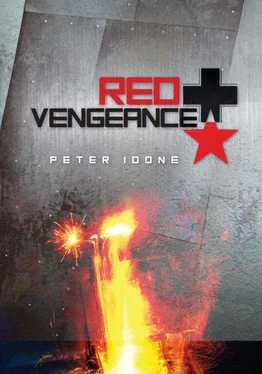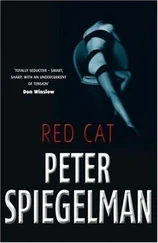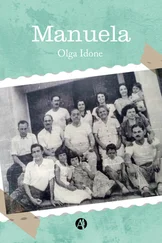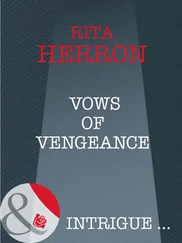After a while, the fear and the stench that accompanied it subsiding, Angst got up, panting, and returned to the smoldering assault gun. He found Lustig lying face down. He turned him over. The chest had been reduced to a wet, pulpy sack. He knelt down beside the body and removed the pay booklet from the breast pocket of the field tunic. Having to touch the blood-soaked remains filled Angst with nausea and grief. His bloodstained fingers shook as he undid the pin to the Iron Cross and Infantry Assault medals. What consolation, if any, these decorations would have for the sergeant’s family, Angst didn’t know, but he would see to it they received the medals all the same. He had developed a grudging admiration for the sergeant over the past several weeks. Lustig had a knack for sizing up a grenadier at a glance, determining his strengths and weaknesses, and getting the most out of what the individual had to offer. After only a week at the front, he had placed Angst in charge of a rifle squad. Angst tried to excuse himself from the responsibility, claiming he was too new at the front and hadn’t served in combat since the invasion of France. His excuses mattered little, as far as Lustig was concerned. The sergeant had pointed to the Iron Cross 2nd Class ribbon sewn on the buttonhole of Angst’s tunic and said the award wasn’t earned for polishing a lieutenant’s boots or for picket duty on the Atlantic Wall. “Besides, I think I’m beginning to understand you,” Angst remembered the sergeant saying. “You will function much better given the added responsibility. Otherwise you will hide within the platoon and not offer your better qualities.” Angst didn’t know he possessed any “better qualities,” but refraining from standing out, especially in a group and in the army at large, rang true. He had even explained to the sergeant how he’d come to be at the front, that he and the ill-fated Lieutenant Nieheus hadn’t volunteered. Lustig was unfazed. Angst was here now, no matter the reason, and was made squad leader without further argument.
Minnesinger and Wilms approached. They did not speak as Angst separated the identity disc half and pocketed it along with the medals and pay book. He unfastened the magazine pouch that contained three clips for the sergeant’s MP40 that lay nearby. He picked up the submachine gun, unfolded the wire frame stock, and looked for damage. It appeared in good working order. There were two side arms, a standard issue Walther P-38 in a holster and a Russian Tokarev tucked in the belt. As he handled the pistol, a prize souvenir among the troops, Schroeder stepped up and snatched the weapon from Angst’s grasp. “Hey!” Angst exclaimed.
“Armed to the teeth, wasn’t he?” the corporal said and stuck the Tokarev in his own belt. Then Schroeder started to bark orders. “Find out who is still alive and who is wounded. Collect any field rations, water, and ammunition from the dead. Anything we can use.”
Angst didn’t know what was worse about getting killed, the manner in which death occurred or the irony. For Lustig to have survived Stalingrad, the battles along the Donets and the Mius, to survive all that strife and hopelessness only to end up here, crushed to death on the steppes. “Let’s bury him,” he said to Minnesinger, as they looked upon the sergeant’s lifeless form, which had begun to fade out of sight as the flames from the assault gun dwindled.
Schroeder had overheard the remark. “Cover him with a shelter half if you have to, but we can’t afford the time to bury anyone. That tank could return at any moment.”
Minnesinger didn’t balk. It appeared Schroeder had assumed command.
“You’re our platoon leader” Angst said, looking to Minnesinger.
“There are three too many corporals as it is. It only takes one to run this show,” Minnesinger said, as he untied the shelter half from the sergeant’s pack, undid the buttons, and started to drape the body.
Angst helped him and continued to gripe. “He can do anything he wants to us now.”
“Listen, Schroeder’s an NCO candidate. We’re outranked, so let’s forget about it,” Minnesinger replied. But Angst couldn’t forget too readily or accept the escort corporal as their de facto leader. The business about the patrol getting lost in the thicket bothered him, even though he conceded that no matter how hardened the veteran, there were times when panic and fear became so overwhelming that actions were the very opposite of intentions. Schroeder and the machine gun crew could have simply waited out the ambush, clearly aware the situation for the vehicle they were assigned to protect was hopeless from the opening salvo. Once the danger had passed, all three resurfaced, disoriented from whatever phenomenon they had experienced. Angst had yet to put a label on that tale and had a mind to see the thicket for himself.
Braun and Schmidt turned up among the living. Elated, Angst was tempted to embrace them but refrained. They had collected the identity disc halves from the dead and turned them over. It seemed that Angst had become the official keeper of names of the dead. Halle and Franks were among the names, along with the machine gun crew who were the last to leave the Tortoise Line along with Lustig. More irony, Angst thought. There were some names he did not know. Horstmann and Schulze, grenadiers from the escort. All those who remained, the remnants of the platoon and the escorts, numbered a little over a full squad.
“Schroeder’s in charge now,” Angst said but no one had a reaction. Braun and Schmidt did not appear to be bothered by this fact, and Richter, simply glad to be alive, couldn’t care less. “He can have the job, far as I’m concerned.” Other than a few splinters and a graze, Richter was unharmed. He took the MP40 from Angst and looked it over for any possible defects, making sure the clip held no more than twenty-five rounds. A fully loaded magazine of thirty-two 9 mm rounds placed too much pressure on the spring mechanism and caused the machine pistol to jam. This notorious fault was the primary reason Richter preferred the Russian-made sub-machine gun. It could be abused and subjected to the worst conditions and still perform without a hitch. “You ever use one of these?” he asked Angst.
“I’ve been trained.”
Richter returned the weapon. It was more weight for Angst to carry, but the extra automatic weapons were necessary.
Wahl and Seidel were finally located, their nerves shaken but physically whole. Fortunately, any wounds sustained by the living had been slight. Whoever needed immediate attention was seen to. No one was so badly injured as to slow the group down. If that had been the case, in the predicament they now found themselves, that individual would have had to be left behind. Nervousness and the sense of urgency to leave the scene as quickly as possible spurred on the survivors.
“Where were you to meet up with the rest of your battalion?” Schroeder asked Minnesinger.
“Forty-five kilometers west.”
That did not seem at all possible now, Schroeder thought. “Let’s get on with it then,” he ordered, needlessly. It would be light soon, and the yawning immensity of the steppe would once again reveal itself. The stragglers, cut off and inconsequential in the greater scheme, knew an enemy horde could sweep down and destroy them all at its leisure. Taking the lead, Schroeder circled around to the north, giving a wide berth to the thicket. Once the squad straightened and headed in a more westerly direction, Angst, who elected to take the rear, looked over his shoulder. A crimson flush tinged the sky across the eastern horizon. There were fires and pillars of smoke. Another day in hell was ready to be born.
Ahamlet stood a quarter of a kilometer to the west. Clouds of dust billowed several kilometers further beyond, and even with the aid of binoculars, Schroeder could barely detect the outlines of the vehicles, let alone discern their make. An army was on the move, but whether friendly or hostile, he couldn’t tell. While the remainder of the squad lay flat and motionless on the warm ground, he had sent Detwiler and Ganz to cover the rear side of the hamlet, getting ready and in place before they made their entrance. He checked his watch and assumed thirty-five minutes was ample time for the machine gunner and his number two to get into position. The plan was to secure the place before anyone stirred, if in fact any inhabitants still remained, and hide out for an hour or so and get some rest. The men were dead on their feet, and Schroeder was anxious to get under cover. Almost eleven hundred hours. The sun was up, and it was hot. Temperatures would only increase into the afternoon hours. The last thing he wanted was for them to get caught out in the open at the mercy of a Yak or Stormovik patrolling the skies. That worry was uppermost on his mind, but he had no control over it. He could only steady himself with the thought that the Soviet Air Force would be busy attempting to rout the Sixth and First Panzer Armies, which were trying to form a new defensive line, rather than waste valuable aircraft hunting down stragglers caught out on the steppe. The Reds had motorized patrols for that detail, which could explain the ruckus of vehicles and dust further to the west. The only tactic Schroeder could employ at the moment was avoidance. While the machine gun crew established its covering position, Schroeder reviewed their present situation with Minnesinger and Wilms. The corporal had spread his map out on the ground and, with compass and pencil, attempted to establish how far they had traveled. It was abysmal. Minnesinger was of the opinion that that they had no more than fifteen, at most twenty, kilometers before reaching the newly established defensive position. That was optimistic. The ambush from last night, its eerie character, and how it played out had set the small vulnerable squad back. Too much time had been lost. Wilms’s radio had a range of no more than four kilometers at best, and they would have to be right on top of friendly forces before communication was established. The best that could be said was the radio could pick up enemy transmissions in their immediate vicinity. “It’s the only edge we have at the moment,” Wilms commented.
Читать дальше











